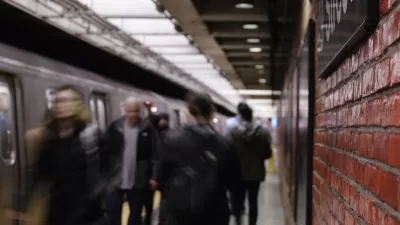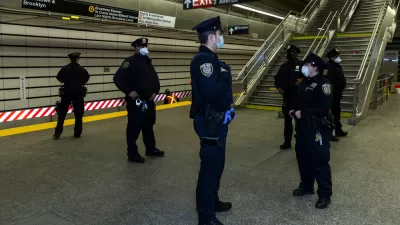Public transit systems in major U.S. cities are starting to focus on non-rush hour travelers as pre-pandemic commuting patterns shift and transportation needs change.

“The new normal for big-city transit agencies is the off-peak rider,” asserts Alissa Walker in Curbed. “The same numbers of people aren’t flooding into central business districts every weekday, but ridership for many agencies has surged on afternoons and weekends.”
Walker continues, “Existing MTA schedules specifically fail workers who have shift or service jobs that don’t follow nine-to-five commuting patterns, according to the ‘Round the Clock is the New Rush Hour’ report by the City Comptroller’s Office.”
These off-peak riders are the people the MTA had in mind when it announced a four-phase plan to increase off-peak service by 2024. The service expansion will start in July with weekend enhancements on three lines — G, J, M — selected because their ridership trends are already demonstrating faster recovery compared to elsewhere on the system.
On the question of whether improving off-peak service would help the agency’s struggling bottom line, Walker writes, “Transit expenditure expert Alon Levy estimates increasing MTA service to six minutes or less systemwide could increase ridership by 15 percent,” though that may not directly translate into higher revenue.
Making New York City transit faster, better, and safer is necessary but not sufficient for bringing back ridership and pulling the MTA back from its fiscal cliff. Walker notes that Gov. Hochul’s state budget also includes a new payroll tax slated to bring over $1 billion in new annual funding for the MTA, and $35 million dedicated to improving off-peak service.
FULL STORY: The Off-Peak Rider Is the Future of the Subway

Planetizen Federal Action Tracker
A weekly monitor of how Trump’s orders and actions are impacting planners and planning in America.

DARTSpace Platform Streamlines Dallas TOD Application Process
The Dallas transit agency hopes a shorter permitting timeline will boost transit-oriented development around rail stations.

Congressman Proposes Bill to Rename DC Metro “Trump Train”
The Make Autorail Great Again Act would withhold federal funding to the system until the Washington Metropolitan Area Transit Authority (WMATA), rebrands as the Washington Metropolitan Authority for Greater Access (WMAGA).

Supreme Court Ruling in Pipeline Case Guts Federal Environmental Law
The decision limits the scope of a federal law that mandates extensive environmental impact reviews of energy, infrastructure, and transportation projects.

Texas State Bills to Defund Dallas Transit Die
DART would have seen a 30% service cut, $230M annual losses had the bills survived.

Bikeshare for the Win: Team Pedals to London Cricket Match, Beats Rivals Stuck in Traffic
While their opponents sat in gridlock, England's national cricket team hopped Lime bikes, riding to a 3-0 victory.
Urban Design for Planners 1: Software Tools
This six-course series explores essential urban design concepts using open source software and equips planners with the tools they need to participate fully in the urban design process.
Planning for Universal Design
Learn the tools for implementing Universal Design in planning regulations.
Roanoke Valley-Alleghany Regional Commission
City of Mt Shasta
City of Camden Redevelopment Agency
City of Astoria
Transportation Research & Education Center (TREC) at Portland State University
US High Speed Rail Association
City of Camden Redevelopment Agency
Municipality of Princeton (NJ)





























